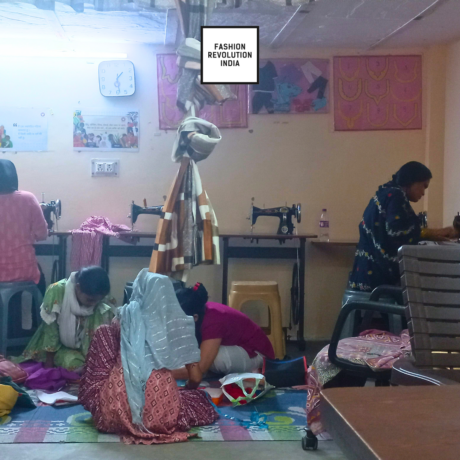This Earth Day 2019, Fashion Revolution signs the Fashion Industry Charter for Climate Action and declares a Climate Emergency
Fashion Revolution has announced today, on Earth Day 2019, that it is declaring a Climate Emergency and has joined the UNFCCC’s Fashion for Global Climate Action initiative as a signatory to the Fashion Industry Charter for Climate Action, marking Earth Day and the start of Fashion Revolution Week 2019 (22nd-28th April).
The science is clear, climate breakdown is happening fast – and the fashion system is a major contributor to global carbon emissions, pollution, water contamination, mass extinction and so many other elements that hinder a healthy planet.
As an organisation, we pledge to do our part to address fashion’s footprint, both in the way clothing is produced, and the collective fashion consumption patterns of our Fashion Revolution community.
The Fashion for Global Climate Action initiative calls on the fashion industry to acknowledge the contribution of the sector to climate change and our responsibility to strive towards climate neutrality for a safer planet.
The move by Fashion Revolution signals the start of a greater global campaigning focus on educating the public about the devastating impact of the fashion industry on global warming, and offering positive actions we can all take to reduce the carbon footprint of our clothes. Fashion Revolution is also taking a stand against the environmental threat to our planet by declaring a Climate and Ecological Emergency.
Carry Somers, Fashion Revolution co-founder and Global Operations Director said: “Through collective action and bold leadership, we have the power to make this fast and drastic transformation. By signing the Charter, we have demonstrated our commitment to playing our part to ensure the fashion sector is on the path to a low-carbon future.”
This year Fashion Revolution Week will highlight how the future fashion industry must respect both people and planet with fair and decent work, environmental protection and gender equality. From Australia to Brazil, Uruguay to Vietnam, more than 275 million people are expected to take part in the campaign by asking brands #whomademyclothes. Over 100 events will be held in more than 100 countries around the world, from catwalks and clothes swaps, to film screenings, panel discussions, creative stunts, open studios and workshops.
“Every time we buy, wear and dispose of clothes, we create an environmental footprint and an impact on the people who make them, most of whom are women. That’s why positive change is more urgent than ever if we are to tackle climate change and create a more equitable future for all,” Carry added.
The fashion and textiles industry is increasingly taking an untenable toll on the environment. Global textiles production emits 1.2 billion tonnes of greenhouse gases annually – more than that of international flights and maritime shipping combined. The EU textile industry alone generates waste estimated at 9.35 million tons per year [i] and overall apparel consumption is projected to rise even further, from 62 million tonnes in 2015 to 148 million tonnes in 2030. [ii] It is evident that the current model of overproduction and overconsumption is harmful not just for the environment, but for the people working for poverty-level wages.
Fashion Revolution Week 2019 will encourage people to recognise their own personal impact and value quality over quantity. It will demand a change in culture where we nurture dignity in work because we cannot afford to live in a world where our clothes destroy the environment, harm or exploit people and reinforce gender inequality.
With this in mind, Fashion Revolution hopes its commitment will inspire citizens and governments to raise their climate ambition in a united effort to limit global warming to 1.5oC. This is a race we can—and must—win to avoid significantly worsening the risk of droughts, floods, extreme heat and poverty for hundreds of millions of people.
If we are to really address the magnitude of fashion’s impact, we must remember that the most sustainable clothing is that which we already own. By extending the lifecycle of our garments by 9 months, we would reduce carbon, waste, and water footprints by 20 – 30%. This Fashion Revolution week, it’s as important to ask #WhoMadeMyClothes as it is to remember that #LovedClothesLast.
To find out what’s happening in your area this Fashion Revolution Week or to find out more about the campaign, visit our events page, see our get action packs and follow us on social media.








